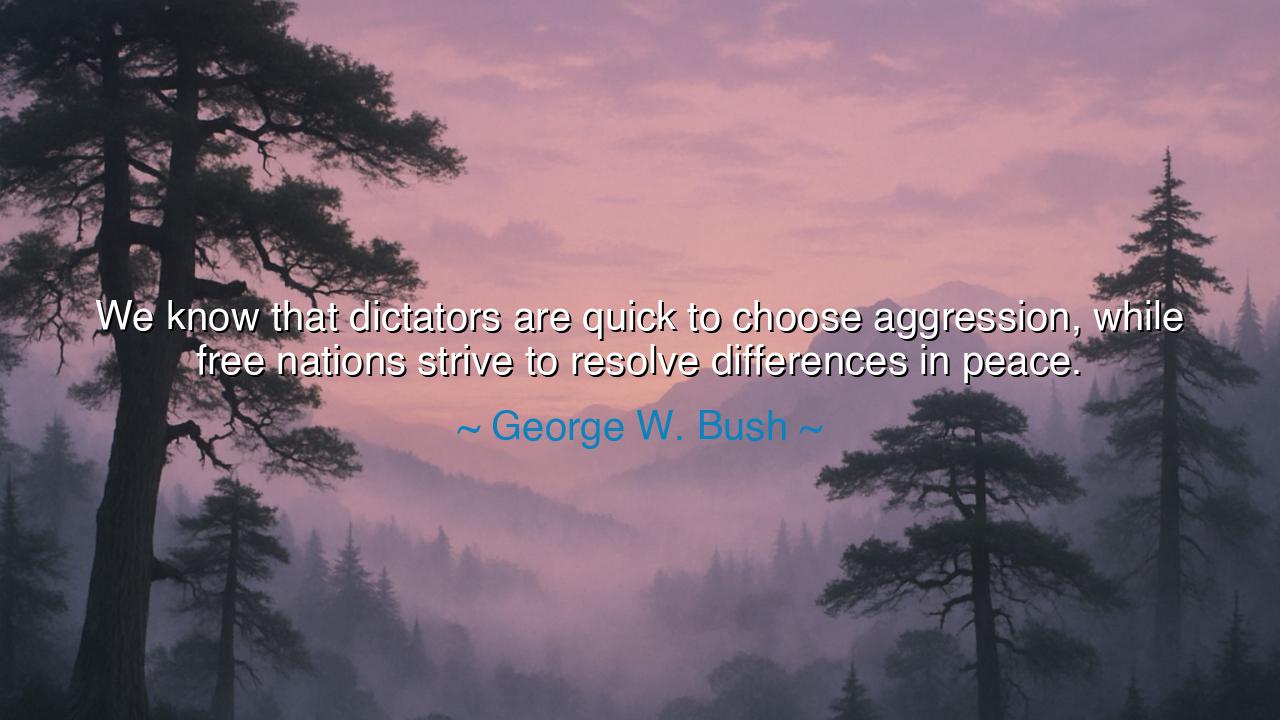
We know that dictators are quick to choose aggression, while
We know that dictators are quick to choose aggression, while free nations strive to resolve differences in peace.






Hear, O children of history, the words of George W. Bush, spoken in the shadow of war and the dawn of a new century: “We know that dictators are quick to choose aggression, while free nations strive to resolve differences in peace.” These are words born not in silence, but in the clash of ideologies, the struggle between tyranny and liberty, and the eternal contest between those who rule through fear and those who seek to govern by trust. They call us to remember that the character of rulers shapes the destiny of nations, and that where freedom lives, peace is cherished, but where dictatorship reigns, the sword is ever unsheathed.
The origin of this truth is as old as civilization itself. The tyrant, whose throne is built on fear, must always turn outward to aggression, for he cannot win loyalty by justice or honor. To maintain his power, he conjures enemies, stirs wars, and feeds the people violence to distract from his oppression. By contrast, free nations—though not without flaw—are rooted in the consent of their people. They seek to settle quarrels with words, to build treaties rather than trenches, because their strength is drawn not from fear, but from unity. Thus, Bush’s words echo the wisdom of the ancients: freedom leans toward peace, tyranny toward aggression.
Consider the tale of Adolf Hitler, the dictator of Germany. In his hunger for domination, he plunged the world into the flames of the Second World War. His aggression was swift and unrelenting, for the dictator’s heart knows no patience. Yet in contrast, the free nations—the United States, Great Britain, and others—sought first to avoid conflict, striving through diplomacy and accord. Only when aggression could no longer be ignored did they take up arms. The contrast could not be clearer: dictatorship feeds war, but freedom labors for peace until forced to fight.
The ancients also bore witness to this truth. In Greece, the tyrants of old ruled by force and spilled blood to maintain their grip, but in the democratic assemblies of Athens, citizens strove to debate, to argue, to reconcile differences through dialogue. So too in Rome: emperors who seized power through fear and cruelty brought ruin, while the Republic, flawed though it was, sought compromise among its citizens. Across ages and empires, the pattern is the same: dictators look first to conquest, free peoples first to reconciliation.
Yet Bush’s words also carry a warning: freedom is not guaranteed, nor is peace automatic. Free nations must remain vigilant, for when they forget their foundations of justice, they too may fall prey to aggression. A democracy that abandons dialogue, that gives in to hatred or corruption, becomes a shadow of freedom, and risks descending into the very tyranny it once opposed. Thus, his words remind us that liberty must be nurtured daily, guarded with vigilance, and kept alive by the will of the people.
The lesson is plain: to preserve peace, one must preserve freedom. For only in freedom can men and women resolve their disputes without bloodshed. Only in liberty can voices be heard without violence, and only in justice can harmony endure. Dictators may promise strength, but it is strength built on sand; free nations may endure debate and discord, but from those struggles arises lasting peace.
Practical action flows from this truth. Defend liberty wherever you dwell, not only in laws but in your daily dealings. Cherish dialogue over silence, understanding over suspicion. Support leaders who seek reconciliation rather than domination, and guard your nation against those who stir hatred to gain power. In your own life, choose peace over aggression, for the spirit of freedom begins not in governments, but in the hearts of individuals.
So remember, O listener: dictators will always rush to war, for their thrones are fragile; but free nations, if they remain true, will always strive for peace, for their strength is the love of their people. Hold fast to freedom, cultivate peace, and teach this truth to the generations that follow—that only in liberty does humanity find the courage to lay aside the sword and choose the better path.






AAdministratorAdministrator
Welcome, honored guests. Please leave a comment, we will respond soon